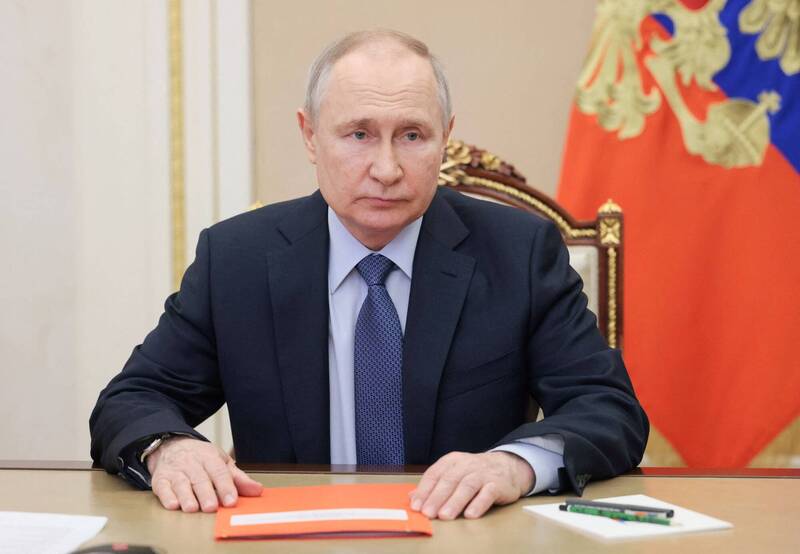ICC issues arrest warrant for Russian President Vladimir Putin over Russia-Ukraine war.
Although putting Putin on trial in the short term is minimal, it may have some impact on his foreign visits.
(Reuters)
(Central News Agency) The International Criminal Court (International Criminal Court) today issued an arrest warrant for Russian President Vladimir Putin in connection with the Russia-Ukraine war.
Although putting Putin on trial in the short term is minimal, it may have some impact on his foreign visits.
Vladimir Putin has been charged with war crimes over the deportation of Ukrainian children to Russia, and the court has also issued an arrest warrant for Maria Alexeyevna Lvova-Belova, Russia's presidential commissioner for children's rights.
Agence France-Presse and other foreign media analyzed whether they will be tried in The Hague, the Netherlands, where the International Criminal Court is located.
Please read on...
● Can Putin be brought to justice
The "Wall Street Journal" believes that the International Criminal Court has no bailiffs and has to rely on the cooperation of 123 member states to enforce the law, but the member states are sometimes unwilling to cooperate, which means that Putin and Libova-Belova are unlikely to stand in the short term dock.
The "New York Times" believes that as long as it can avoid being arrested, the International Criminal Court may never prosecute the accused.
ICC chief prosecutor Karim Khan said when asked that ICC member states could indeed arrest Putin and Livoua-Belova when they entered the country.
Agence France-Presse also believes that although this may make it difficult for Putin to visit abroad, the International Criminal Court does not have its own police force to enforce the law and relies on the cooperation of the member states of the entire International Criminal Court. in the case of a sitting leader of such a country.
The former Sudanese leader Omar al-Bashir was issued an arrest warrant by the International Criminal Court, but he still went to several member states of the International Criminal Court, including South Africa and Jordan; , but the Sultan has not yet surrendered him.
Still, Columbia Law School professor Matthew Waxman affirmed that it was a "very important step for the ICC, although the chances of seeing Putin actually arrested are slim."
● The US, Russia and China are not members of the International Criminal Court
Like the United States and China, Russia is not a member of the International Criminal Court.
The ICC charged Putin because Ukraine is subject to the ICC's jurisdiction, although Ukraine itself is not a member.
Moscow was quick to dispute Putin's arrest warrant, saying Russia would not, under any circumstances, extradite its own citizens to the ICC.
Kremlin spokesman Dmitry Peskov said Russia "does not recognize the jurisdiction of this court and therefore the decision of the ICC is invalid from a legal point of view".
Cecily Rose, assistant professor of public international law at Leiden University in the Netherlands, said Putin was unlikely to be jailed for war crimes barring "regime change in Russia".
● What are the precedents in the past
The ICC's Kalin Khan said there had been no shortage of heavyweights in the past who had been prosecuted for war crimes against all odds.
He said: "There are a lot of cases where you think you can get away with it and you have to go to court. Look at Slobodan Milosevic, Taylor (Charles Taylor, Radovan Karadzic or Muladic). Ratko Mladic)."
Former Serbian President Milosevic was accused of committing dozens of crimes in the wars in Croatia, Bosnia and Kosovo. After he stepped down, he was arrested and extradited to The Hague. Died in a cell in The Hague during a genocide trial by a court (ICTY).
In 2012, the International Criminal Court convicted ex-Liberian President Taylor of war crimes and crimes against humanity.
Former Bosnian-Serbian leader Karadic was finally arrested in 2008, when the Yugoslav International War Crimes Tribunal found he had committed genocide. His military commander, Mladic, was also arrested in 2011 and sentenced to life in prison.
● Are there any other options
The ICC's inability to try suspects in absentia is an impediment to the difficulty of prosecuting accused persons.
But Khan pointed to the recent case in which he asked a judge to hold a hearing to confirm the charges against Joseph Kony, the leader of the Lord's Resistance Army, which waged a bloody insurgency in Uganda.
Connie is still at large.
The New York Times believes that Karin Khan's petition is a wind blow to test whether the International Criminal Court will agree to allow the fugitive defendant to be convicted and then start the trial; the court has not yet decided.
